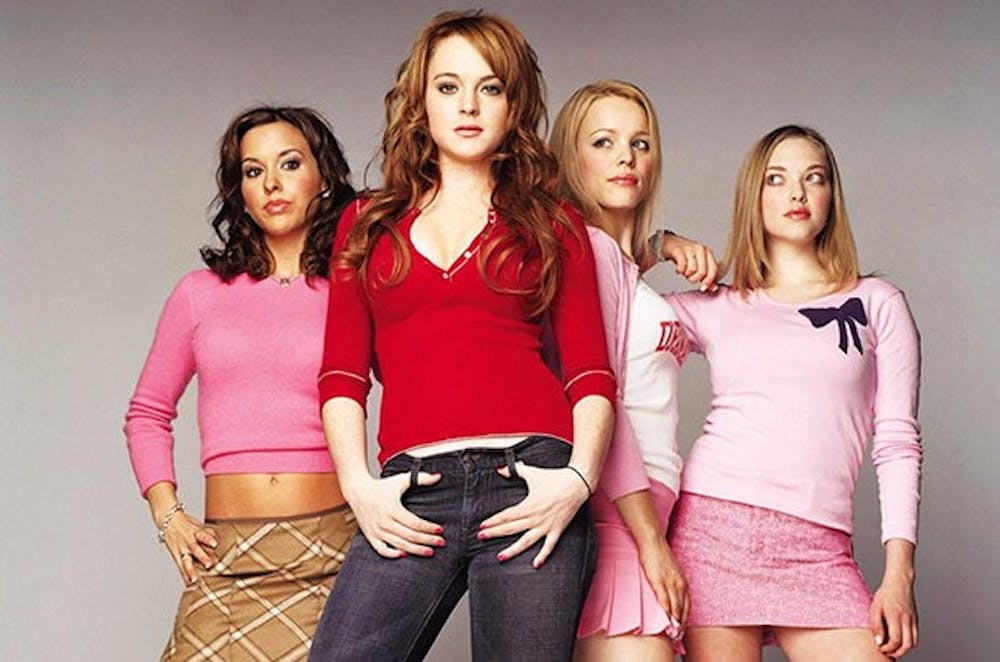Before Friday, I had never seen “Mean Girls.”
My mom raised a pretentiously self-aware child who thought high school-oriented movies were dumb and that the mean girl stereotype needed to die because girls hurting girls is not feminism. My role model was and always will be Martha Stewart.
So, I decided to spend an hour and 37 minutes of my life knitting instead of watching that movie.
I still haven’t finished that scarf.
Meanwhile, the movie seeped into my consciousness, and I’ve been able to quote scenes I’ve never seen because of its pop-culture reach.
Me: 0. “Mean Girls”: 1.
But on Friday, in anticipation of the musical, I watched “Mean Girls.”
Besides its amount of snarky one-liners that can be used in daily conversation, such as yelling “none for Gretchen Wieners” to the poor patrons of the specialty donut shop where you just snagged the last pastry, or continuously commenting “she doesn’t even go here” to convey your annoyance that your roommate’s long-distance girlfriend is staying for a week in your 12-by-13 foot dorm room, or saying “grool” when you can’t decide if something is great or cool, “Mean Girls” is witty, intelligent and straight-up good.
Me: 0. "Mean Girls:" four for Glenn Coco.
The way in which “Mean Girls” satirizes high school is hauntingly true and effective.
The cast of “Mean Girls” is the key to the movie’s successful satire — which is saying something because, besides Lindsay Lohan, I didn’t know who acted in “Mean Girls.”
Acadamy Award-nominated actress Rachel McAdams, popped on the screen as a life-sized Barbie with anger issues — Regina George — and I said, “What,” in a stupor of admiration for her acting flexibility.
To get the day's news and headlines in your inbox each morning, sign up for our email newsletters.
Amanda Seyfried, who I respect as a powerful woman in film — specifically in “Les Miserables” (2012) and “While We’re Young” (2014) — plays the airhead Karen Smith. When she blurted out, “On Wednesdays we wear pink,” I blurted out, “Wait!!! I love her.”
And the best-duo-ever-forget-Simon-&-Garfunkel superlative, of course, goes to comedians Tina Fey and Amy Poehler. I started laughing before they said a line because they’re that funny.
The cast flawlessly exaggerated high school stereotypes to blatantly expose the feelings of high school girls: isolated and wary of even their closest friend’s trust.
As Cady Heron — played by Lindsay Lohan — experiences public school for the first time, I was able to see high school’s peculiarities with fresh eyes. Specifically, how girls treat other girls: like crap.
Dramatic? Maybe. But these students can’t drive until two years into high school, can’t vote and can’t drink — so everyone is agreed that they aren’t socially or emotionally mature.
“Mean Girls” promotes the end of talking behind friends’ backs, of telling each other’s secrets and of sacrificing friends for popularity.
In a powerful scene, all junior class girls raise their hands, confessing they’ve betrayed a friend’s secret before. In this moment, viewers realize that they, too, have victimized their friends, whether intended to harm or not.
The problem is deeper than the popular clique at school. It’s all of us, and it’s not OK.
While I thought I was being mature by knitting a scarf that now warms no one’s neck, “Mean Girls” was fighting and continues to fight girl-on-girl hate.
As a millennial cult classic, “Mean Girls” warrants a play counterpart to further the fight for female friendship.
swerve@dailytarheel.com




